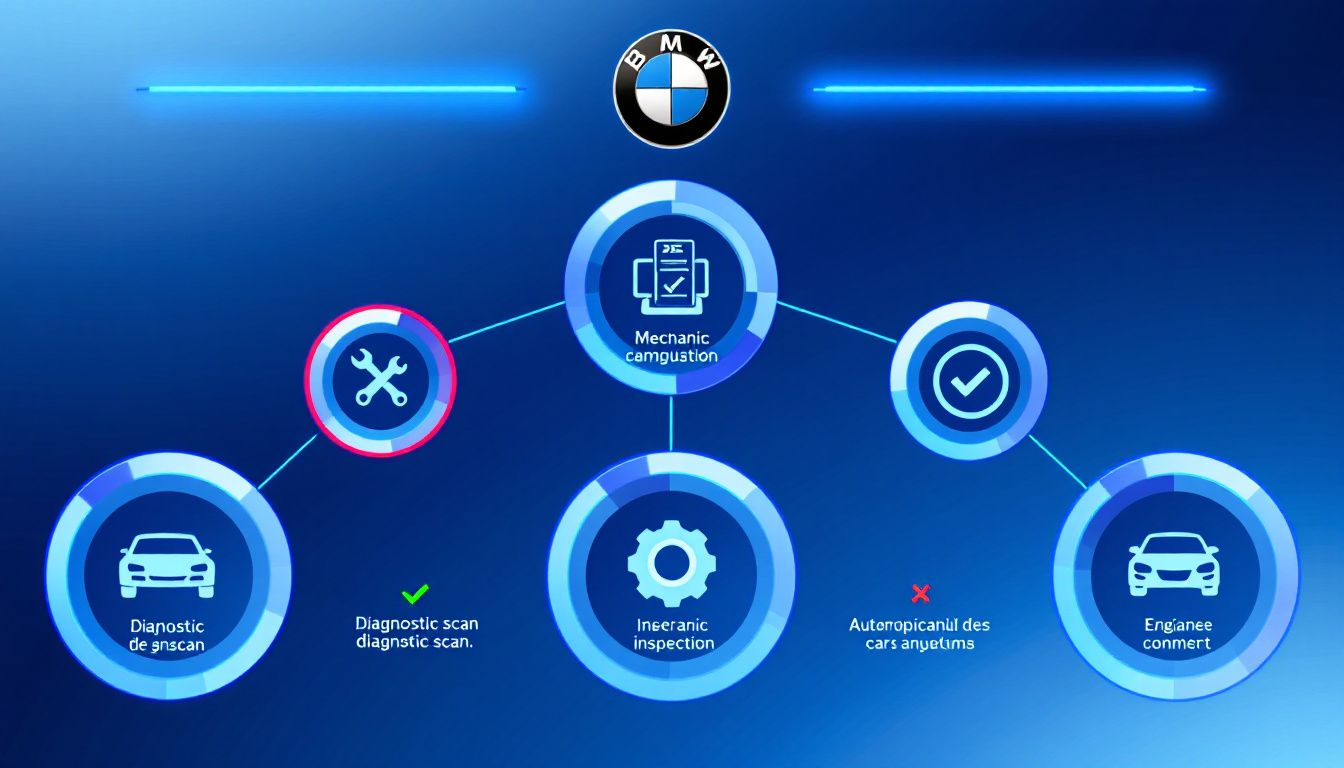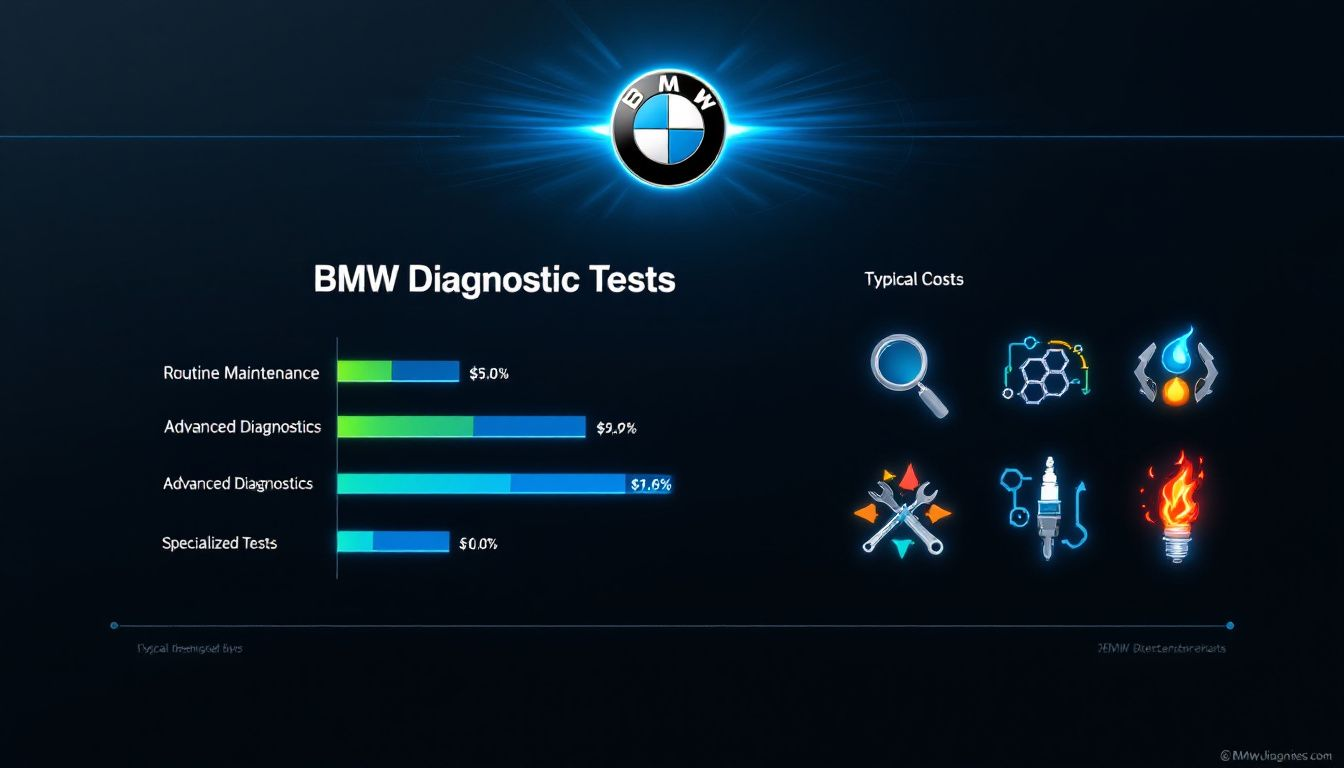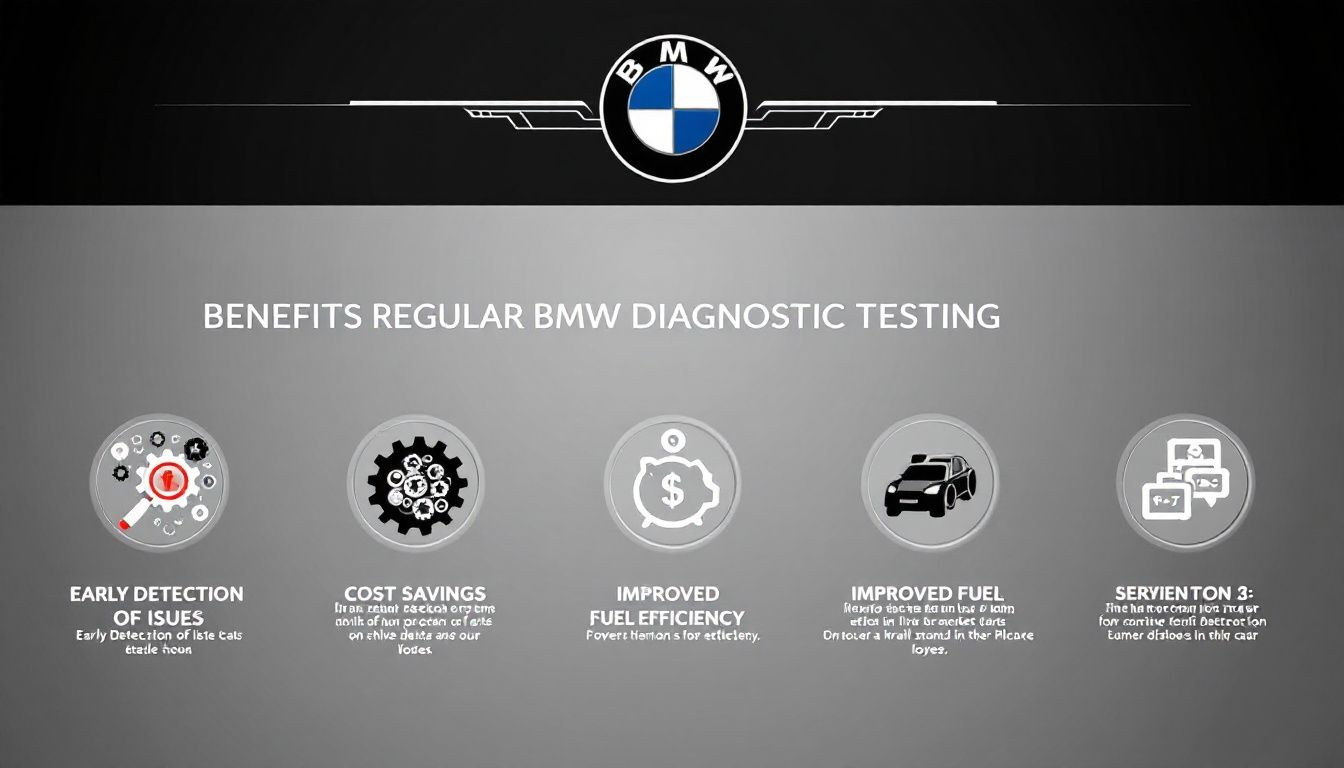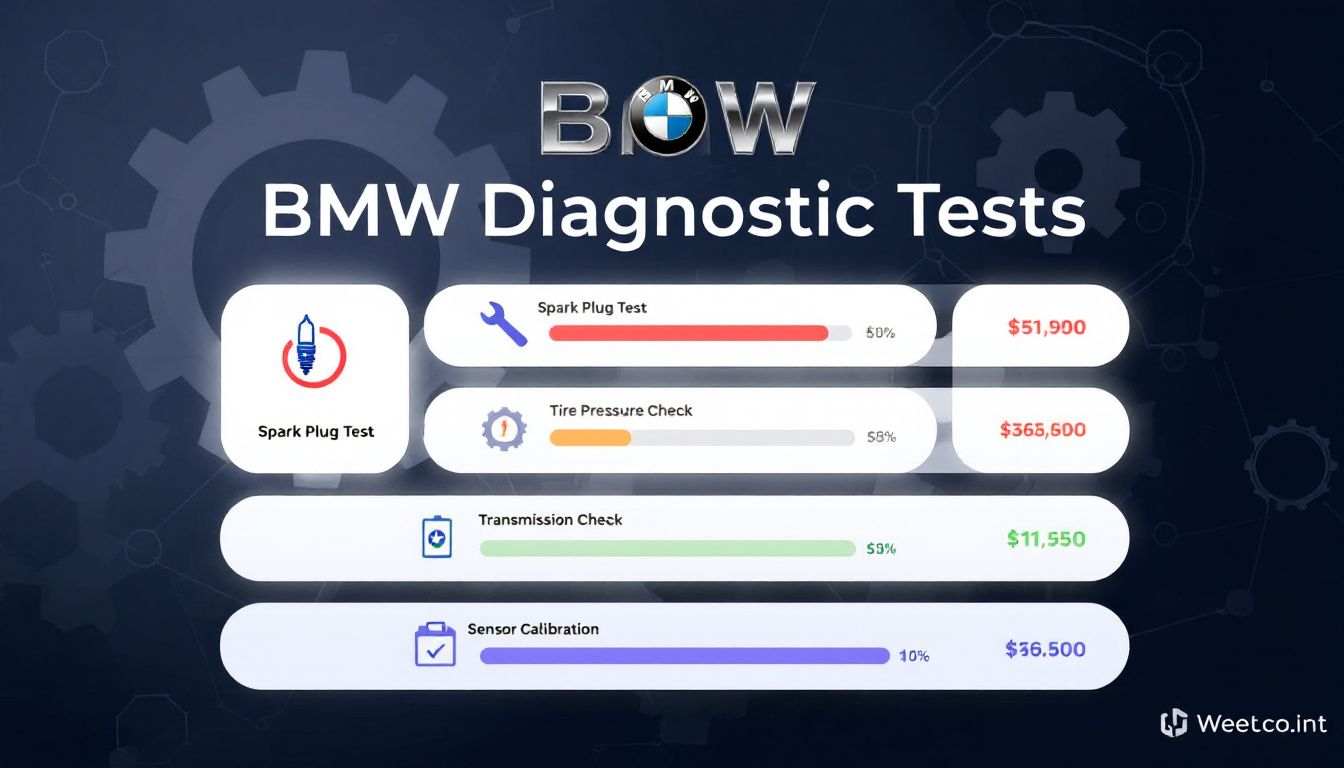Trying to understand the BMW diagnostic fee? This guide explains the costs, why they’re charged, and how these tests benefit your car’s performance.
Key Takeaways
- BMW diagnostic tests provide comprehensive evaluations of vehicle systems, essential for accurately identifying issues.
- Diagnostic fees typically range from $100 to $200, varying based on complexity and location, but are justified by the expertise provided.
- Regular diagnostic testing is crucial for vehicle maintenance, offering early detection of potential problems and enhancing the longevity of your BMW.
Understanding the BMW Diagnostic Fee: What to Expect

Knowing what the diagnostic fee entails is important for BMW owners. This fee includes the time and expertise needed to evaluate your vehicle’s issues, often involving a detailed check of computerized components and electrical systems. Some customers may find these fees high, especially if they suspect they know the problem, but these tests are essential for accurately identifying issues.
GAIN MORE CONTROL OF YOUR CAR WITH THE CARLY FEATURES
Check the exact pricing of Carly for your car brand!

Fast International Shipping with DHL

14 days adaptor return policy

Excellent customer support

Lifetime warranty in the hardware
SEEN IN
A BMW diagnostic test is a comprehensive examination of your vehicle’s control units and ECU. Trained BMW mechanics can accurately read and interpret these tests, identifying problems that might otherwise be missed. This professional expertise is what you pay for with the diagnostic fee.
BMW diagnostic testing is a valuable investment. It identifies potential problems with tested components, offering peace of mind and preventing more significant issues later. Although it’s an out-of-pocket expense, the reliability and accuracy of professional diagnostics make it worthwhile for maintaining your BMW.
Introduction
Owning a BMW signifies more than just possessing a high-performance vehicle; it represents a commitment to meticulous maintenance and diagnostic assessments, called bmw. This responsibility is part of the status symbol that comes with owning a BMW, ensuring your car remains in optimal condition and continues to deliver the driving experience you expect.
Knowing the costs and processes involved in BMW diagnostics helps you make informed decisions about your vehicle’s maintenance, avoiding unnecessary expenses and ensuring your car’s longevity.
From the diagnostic fees to the benefits of regular testing, this guide will provide you with a comprehensive overview of what to expect when it comes to BMW diagnostics.
What is a BMW Diagnostic Test?
A BMW diagnostic test checks the working condition of your vehicle by analyzing computerized components, control units, and electrical systems, including the ECU. This comprehensive check ensures that all electronic components and systems in your BMW function correctly, identifying issues that might not be immediately apparent.
Typically, a full BMW diagnostic test takes about one hour, though it can extend up to 90 minutes depending on the complexity of the issues. In some cases, more complicated problems might require an additional 2 to 3 hours of diagnostic work. This detailed process is necessary to accurately diagnose and address any underlying issues, preventing more severe problems in the future.
Some customers may perceive these diagnostic fees as excessive, especially if they think they know the problem. However, the expertise and precision of trained BMW mechanics are invaluable. Their ability to accurately read and interpret diagnostic tests ensures your BMW remains in peak condition.
Typical Costs for BMW Diagnostic Tests

The cost for a BMW diagnostic test typically falls between $100 and $200, with a standard fee around $135. These costs can vary based on several factors, including the complexity of the issue and the specifics of your vehicle. Independent mechanics might charge diagnostic fees ranging from $169 to $350, depending on the complexity of the problem.
Knowing these costs upfront helps you budget for your vehicle’s maintenance. Although it might seem like a significant expense, this fee covers the expertise and time needed to accurately diagnose your BMW, ensuring any issues are identified and addressed promptly.
Factors Affecting Diagnostic Fees
Several factors can influence the diagnostic fees for your BMW. The complexity of the vehicle’s issues plays a significant role. More complicated problems require more time and expertise to diagnose, resulting in higher fees. Additionally, the location of the dealership can significantly impact the fee structure. Dealerships in urban areas or regions with a higher cost of living may charge more for diagnostic tests.
Different dealerships have varying policies regarding diagnostic fees, including potential waivers if you choose to have the repairs performed there. Inquiring about these policies before agreeing to a diagnostic test is advisable. Some customers may feel pressured to pay for diagnostic tests even when confident about the required repairs, so understanding the dealership’s policies helps manage expectations and costs.
The time taken for diagnosis can also affect the overall cost. A thorough diagnostic test might take longer if the issues are complex, leading to higher diagnosis fees. However, these costs are justified by the detailed analysis and accurate identification of problems.
Some customers have found simpler solutions to their problems after being quoted high diagnostic fees. This highlights the importance of seeking a second opinion if you’re unsure about the initial diagnosis.
Dealership vs. Independent Mechanic: Cost Comparison

When it comes to diagnostic fees, BMW dealerships and independent mechanics offer different experiences and costs. Diagnostic fees at BMW dealerships can vary significantly based on the dealership’s policies and the specifics of the diagnostic test. A typical diagnostic fee at a BMW dealership might be around $239, which could be waived if you decide to have the repairs done at the same dealership.
On the other hand, independent mechanics often charge higher initial diagnostic fees compared to BMW dealerships, sometimes exceeding those fees by $100 or more. While independent mechanics might offer cost-saving alternatives and a more personalized service, they may lack the specialized knowledge that BMW dealerships provide.
Choosing between a dealership and an independent mechanic depends on your priorities. If you value specialized knowledge and potentially lower diagnostic fees, a BMW dealership might be the better option. However, if you’re looking for cost-saving alternatives and personalized service, an independent mechanic could be more suitable. Weighing these factors helps you make the best decision for your BMW’s maintenance.
Can You Perform BMW Diagnostics Yourself?
Performing your own BMW diagnostics is a viable option for many owners. With the right equipment, such as a laptop and a coding cable, you can connect to your vehicle and use BMW diagnostic software to identify issues across various systems. This DIY approach can significantly reduce the cost of BMW diagnostic fees.
One effective tool for DIY diagnostics is Carly’s On-Board Diagnostics (OBD). This device allows you to perform comprehensive diagnostics on your BMW, providing detailed reports on potential issues. While performing diagnostics yourself can save money, recognize that a non-trained person might miss some indications of problems. For this reason, it’s crucial to be thorough and seek professional help if you’re unsure about the results.
Besides using diagnostic tools, you can reset certain service indicators without specialized equipment by using your vehicle’s odometer button. This can help manage minor issues and avoid unnecessary trips to the mechanic. However, for more complex problems, professional diagnostics remain the best option to ensure your BMW’s optimal performance.
Are BMW Diagnostic Tests Covered by Warranty?
BMW diagnostic tests are typically covered under warranty if your vehicle is still within the warranty period. This coverage can be a significant relief, as it means you won’t have to pay out-of-pocket for these essential tests. However, it’s important to verify with your service technician whether the diagnostic test is covered, especially if no issues are detected during the test.
Diagnostic testing is usually not covered by auto insurance, but it may be included under your BMW warranty. To avoid unexpected charges, always check with your service department technician beforehand. If no problems are found during the diagnostic test, confirm whether you’ll be charged for the service.
This proactive approach can help you manage costs and ensure you’re fully aware of what is covered under your warranty.
Benefits of Regular Diagnostic Testing

Regular diagnostic testing ensures your BMW functions optimally. These tests help identify potential issues before they become major problems, saving you from costly repairs down the line. Routinely checking all electronic components and systems helps maintain your vehicle’s performance and longevity.
Routine diagnostic testing keeps your BMW running smoothly and provides peace of mind. Knowing your vehicle is in good health allows you to enjoy the driving experience without worrying about unexpected breakdowns. After a diagnostic test, additional inspection by a mechanic may address any identified issues, preventing further costs associated with unresolved problems.
Incorporating regular diagnostic testing into your maintenance schedule is a proactive step towards preserving your BMW. It ensures that any issues are promptly identified and addressed, keeping your vehicle in top condition and enhancing its lifespan.
How Accurate Are BMW Diagnostic Tests?

BMW diagnostic tests are highly accurate in identifying a wide range of issues within your vehicle. These tests help narrow down potential problems with various components, providing a clear picture of your BMW’s health. However, it’s important to note that while diagnostic tests are reliable, they are not infallible and may require further evaluation by a skilled mechanic.
Even after a thorough diagnostic test, additional inspections might be necessary to confirm any suspected issues. This step ensures that any problems are accurately diagnosed and appropriately addressed, preventing further complications. The detailed nature of BMW diagnostic tests makes them a valuable tool in maintaining your vehicle’s performance and reliability.
Understanding the limitations and strengths of diagnostic tests helps you make informed decisions about your BMW’s maintenance. Regular testing, combined with professional inspections, keeps your vehicle in peak condition, ensuring a safe and enjoyable driving experience.
Summary
In conclusion, understanding BMW diagnostic fees and the importance of regular diagnostic testing is essential for responsible vehicle ownership. These tests, while sometimes perceived as costly, provide invaluable insights into your BMW’s condition, helping to identify and address issues before they escalate. Whether performed at a BMW dealership or through DIY methods like Carly’s On-Board Diagnostics, these tests ensure your vehicle remains in optimal health.
Regular diagnostic testing, combined with professional expertise, guarantees that your BMW continues to deliver the performance and reliability you expect. By staying informed and proactive, you can manage maintenance costs effectively and enjoy the peace of mind that comes with knowing your vehicle is well cared for.
Frequently Asked Questions
What is a BMW diagnostic test?
A BMW diagnostic test is a comprehensive evaluation of your vehicle’s electronic systems, including the ECU, to detect any existing problems. This process ensures your vehicle operates efficiently and safely.
How much does a typical BMW diagnostic test cost?
A typical BMW diagnostic test costs between $100 and $200, with an average fee around $135. This price may vary depending on the complexity of the issue and the specifics of your vehicle.
Are BMW diagnostic tests covered by warranty?
Yes, BMW diagnostic tests are typically covered under warranty if your vehicle is still within the warranty period. Always confirm your specific coverage with your service technician.
Can I perform BMW diagnostics myself?
Yes, you can perform BMW diagnostics yourself using tools like Carly’s OBD, but for complex issues, professional diagnostics are advisable.
Why are regular diagnostic tests important for my BMW?
Regular diagnostic tests are vital for your BMW, as they help identify potential issues early and ensure all systems are functioning properly, ultimately preserving the vehicle’s performance and longevity.

